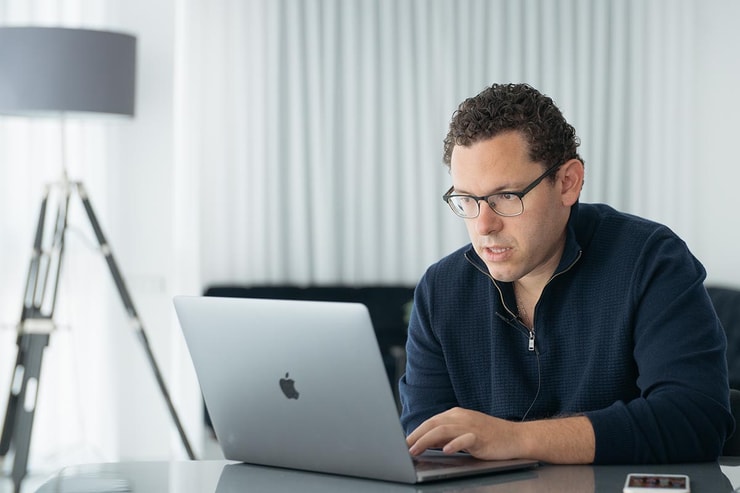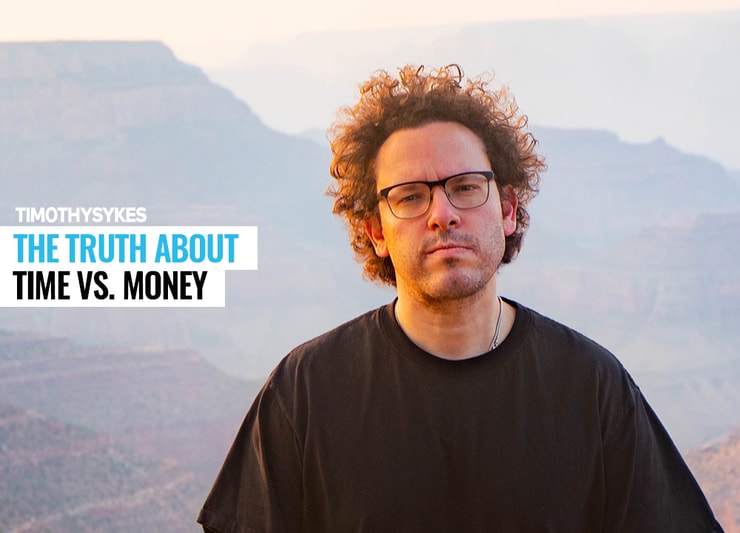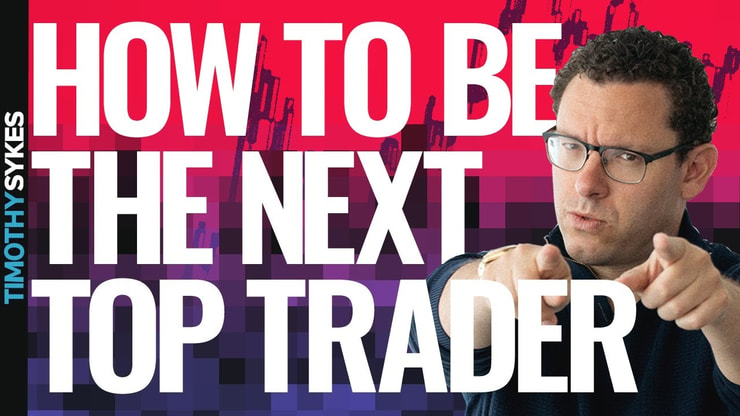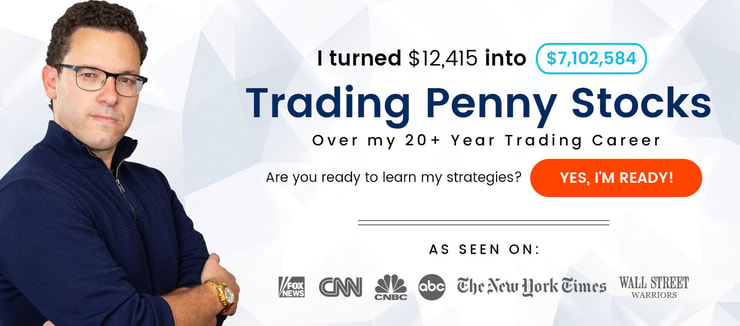Time vs. money … it’s an age-old battle that came to my attention again recently. One of my students tweeted about how much people spend on college just to get a job that doesn’t pay very well.
Check it out…
I love @timothysykes
Say what you will about him. He sells information about how to make money in the stock market. People will hate on him for his coaching. Those same people will spend $100k on college to make 60k a year.
I paid for one of his courses. Not ashamed. Making $ https://t.co/hGK8GzahA4
— Fred The Felon (@felon_fred) October 17, 2020
What do you think?
Table of Contents
Time vs. Money: What’s More Valuable?
For me, time is more valuable than money. You don’t get time back. Ever. You can always make more money. (Especially once you learn a repeatable money-making strategy like trading.) But you NEVER get your time back.
Think about it … Would it be more painful to lose several years or a lot of money? At least one study shows that losing time is more painful.
So before you go and waste a whole lot of time, I wanna be blunt. Let’s start with…
Two Nasty Facts About Trading
Fact #1: The financial industry is full of negativity and hate.
Fact #2: The financial industry is full of sketchy companies, fake teachers, and slimy promoters.
But the industry full never change because there'll always be small-time crooks & crappy companies that need pumping, the best defense is education & to see how the game works! Watch https://t.co/KhqHFIvHsM & read https://t.co/odGAkRPNNf & https://t.co/QTYT7tQ5da I'll show you 🙂
— Timothy Sykes (@timothysykes) October 16, 2020
Most people are very confused. And that’s why…
Most Traders Lose
Academic studies show that 90% of day traders lose money. The same studies show that if you stick with it long enough, you can get over the profitability threshold. Which is why your focus should be on becoming a self-sufficient trader.
To do that, you’re going to have to study hard. But beware of learning from just anybody who claims to be a teacher…
More Breaking News
- IPDN’s Unexpected Surge: Should Investors Pay Attention?
- Equinix Bounces Back: Projections and Possibilities
- B2Gold’s Market Movements Explained
Many So-called Teachers Are Frauds or Fakes
It might sound crazy, but it’s true. A lot of the people who supposedly teach trading aren’t real. Not all, but enough to make you question who to trust.
Sadly, the worst fakes are those who say they teach for free. They lure in newbies who lose their hard-earned money without learning anything. That’s one of the reasons I spend so much time trying to deprogram them.
Then there’s me, over here trying to explain…
The Difference Between Time vs. Money
Everything I do is to speed up your learning curve. I’m trying to teach you what I’ve learned the hard way over 20+ years.
It’s not even a personal thing — it’s factual. There is a way to potentially make millions. It’s not easy or fast. I will teach you everything I’ve learned. But yes, you’ll have to invest in your education.
And if you’re not ready to invest, I have so much free, no-cost, or low-cost training that you really have no excuse.
But you will have to invest time. And whether you pay the market’s version of tuition or pay a teacher, you will spend money eventually. Nobody gets to financial freedom in the markets without spending both time and money.
Your goal should be to cut down the time without paying the worst kind of price. And that means you have to learn to study the right way.
Time vs. Money: Truth in Numbers
Let’s say you’re ready. You say, “Yes, Tim, I want to learn. I’m going to be dedicated…” Then you apply for the Trading Challenge, get accepted, and get to work.
The most you can spend with me is a few thousand dollars. And that’s over several years. We even have a Lifetime Challenge — where you make an investment and you’re in for life.
(Weirdly, many of my Lifetime students report doing much better. It’s like all the pressure to figure it out within a year melts away. Once you accept it’s a marathon and not a sprint, it can actually get easier. You’re less likely to force trades.)
All My Top Students Did THIS First…
The Extortionate Cost of a University Education
There are colleges where you spend $40K or $50K per year! Like @felon_fred said in his tweet, people are spending $100K on college to make $60K per year. I think he’s being a little generous…
I don’t know what kind of college graduates make $60K per year. But I know a lot who make $20K or $30K per year. Some might even make $40K right out of college. And a lot of those same graduates could be getting laid off right now because the economy is tough.
Contrast that with three of my top students…
Matthew Monaco and Kyle Williams graduated from college last spring and they’re crushing it.* Then there’s Jack Kellogg. He didn’t even go to college and he’s officially made $1 million in trading profits.*
(*These results are not typical. Individual results will vary. Most traders lose money. My top students and I have the benefit of many years of hard work and dedication. Trading is inherently risky. Always do your due diligence and never risk more than you can afford to lose.)
Did I mention student loans?
Student Loans: Debt That Keeps on Taking
Some people are in student loan debt basically forever. Even if you declare bankruptcy! Your student loans are only forgiven in exceptional cases. And it’s not an automatic process.
If you think about it, it’s kinda weird. God forbid you want a better life for yourself or your family. Your student loan debt just keeps on keeping on…
So the problem isn’t with me. It’s with the system. Maybe I should set up a trading university and charge a lot more. Maybe then more people would value their education. For me, I’m not looking for more students.
My problem is finding more dedicated students. Some people actually say to me, “I don’t want to pay you, I’ll learn for free…” Buh-bye. You just saved me time. I have limited time. Time is more important to me than money. That’s the reality of time vs. money for me.
Value Education or Condemn Yourself

2025 Millionaire Media, LLCIf you don’t value your education you condemn yourself to repeat the mistakes of the past. Why would you want to do that?
I’m not saying you won’t make mistakes. You will. You’ll take losses on trades. But you don’t have to make as many mistakes or lose as much. You can learn from the mistakes I made because you can see what I did and where I went wrong.
A great example is my biggest loss. I lost roughly $500,000 on one company. My first mistake was that I believed in the company. I bought the hype. It was all a smokescreen. Not because the technology was bad — turned out the technology was solid…
But the company wasn’t run well. It was bleeding cash. (Read about my biggest loss in “An American Hedge Fund” — download it for no cost here.)
What did I learn? Never believe the hype. Always expect the worst from these companies and you’ll never be disappointed.
Stop saying, “But the tech! This company is going places…”
Penny stock companies aren’t those companies. No matter how bad you want them to be. Trade the ticker. Take advantage of informational inefficiencies. But don’t invest in these companies. You’ll just get disappointed.
Again, you have to decide what’s most important in the question of time vs. money. But understand that having money can give you the opportunity for freedom. If you have enough money, you get to choose how to spend your time.
But it’s counterintuitive, because…
Time Marches On
Time is the most valuable asset in the world. Not money. You never get time back, no matter how rich you get. No matter how successful you get, time is always moving forward. And for too many people, it marches on without them paying attention until it’s too late.
Imagine what it would be like if you had enough money to live comfortably for the rest of your life. What would you do with your time? How would you maximize your life? Once you see that vision of yourself, it gives you a reason to make enough money to break free.
It won’t happen overnight — so don’t for one second think I’m trying to give you some BS get-rich-quick scheme. I’m not.
Your wealth & happiness is determined by your work ethic, strategy & dedication/patience while learning. Most people want overnight success/get discouraged by early losses/failures/the amount of work required to create your dream life. Study consistently & be rewarded over time!
— Timothy Sykes (@timothysykes) October 17, 2020
This is about finding the fastest possible ethical and legal route to freedom.
For Love or Money?
One of the most important considerations in life is this: do you love what you do? If you find something you truly love, it will help solve the question of time vs. money.
I’ve met more than one unhappy billionaire. Getting rich doesn’t make you happy. So you have to find something you love to do.
For example, I love trading. But I’m even more passionate about teaching and donating to charity. So I’ve optimized my trading to teach and earn for charity. Not as a way to make money for myself.
Educate Yourself to Save Time
Here’s another super important lesson when it comes to time vs. money…
Getting the right kind of education will potentially save you time and money. Again, you could learn everything I’ve learned over the past 20 years all by yourself. But do you really want to take that long to do it?
The other part of that is … what price do you want to pay for your education? And how will you pay for it? Will you pay a higher price in both time and money? Or will you choose to shorten your learning curve?
Again, either way, you’ll have to pay. But the market will make you pay a much steeper price. Again, it’s time vs. money.
Time-Saving Resources

2025 Millionaire Media, LLCMy team and I put together a ton of resources for you to learn. Some are free, others require an investment. You get to choose.
Time vs. Money: What’s Your Level of Commitment?
You don’t have to spend a lot of money to start learning. You can start today. We have something to fit every budget.
If you’re brand new to penny stocks, my FREE penny stock guide provides an essential overview.
My YouTube channel has 1,546 videos (and growing). All free. You’ll find videos showing my favorite patterns, live trading examples, rules, and more. If you’re really serious about learning… subscribe and watch every video. Watch them multiple times. Take notes. (Hit like on the videos and leave comments, too, please.)
This blog has thousands of posts — like the one you’re reading now. Every post has valuable trading information. You might see some repetition, but that’s on purpose. For example, I say rule #1 is to cut losses quickly, again and again, to burn it into your brain.
My best selling book, “An American Hedge Fund” is FREE to download here. You have no excuse. Get it and read it.
Follow me on Twitter and Facebook. It’s a great way to fill in the gaps if you’re not ready to invest in your education. For example, some days I do a daily trading recap video and post it on Facebook.
The 30-Day Bootcamp Should Cost $1,000!
But it doesn’t. We’ve kept the price at an insanely low $79. That’s less than the price of a coffee every day for a month. (From the most famous coffee shop in the world. You know the one.)
The difference is, you get access to the 30-Day Bootcamp for life. PLUS: you get a copy of “The Complete Penny Stock Course” AND the original “Pennystocking Framework” DVD guide. Those two resources will help you save even more time — as long as you invest the time up front.
Monthly Plans
Yes, we have plans designed to fit a monthly budget. There’s something for everybody. Check out the monthly plans here.
For existing Trading Challenge students: to become a Lifetime Challenge member, contact my team here. (Put ‘Lifetime Challenge’ in the subject line.)
The Best Deal Ever
I can’t reverse time. But I can save you time. For that, I charge a little bit of money. But if you don’t understand that, if you don’t value my time, if you don’t value YOUR time…
Then you get NONE of my time. That’s the reality. Again, you choose.
Time vs. money — which is more valuable to you? Comment below. I love to hear from all my readers!








Leave a reply